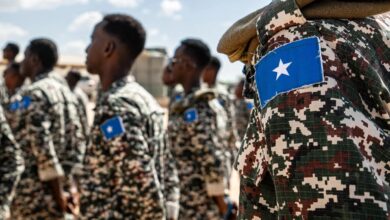A Kenyan court on Thursday, May 9 sentenced British terror suspect Jermaine Grant to four years prison for possessing bomb-making materials, charges the accused extremist has long denied.
Grant, who is accused by Kenyan authorities of ties to East Africa militant group Al-Shabaab, is already serving a separate nine-year sentence on forgery charges.
The Muslim convert was arrested in Mombasa in December 2011 by police who allegedly found chemicals, batteries and switches in his possession.
Police said Grant was planning a bombing campaign against hotels popular with foreign tourists.
He denied the charges but was found guilty on April 24 by Chief Magistrate Evans Makori, who said there was sufficient evidence that Grant was in possession of the explosive materials.
Grant was sentenced in December 2015 to nine years in jail on separate charges related to forgery. He had earlier plead guilty to being in the country illegally and lying about his nationality.
Prosecutors in Kenya had accused Grant of working with fellow Briton Samantha Lewthwaite, dubbed the “White Widow” by the British tabloid press.
Lewthwaite is the widow of Germaine Lindsay, one of four suicide bombers who attacked the London transport network on July 7, 2005, killing 52 people.
Despite repeated rumours there has been no confirmed sighting of her since she gave Kenyan police the slip in Mombasa in 2011.
Grant is believed to have become radicalized as a teenager in the same U.K. prison where “shoe bomber” Richard Reid first turned to Islam.
Reid, who claimed he was an Al-Qaeda recruit, is serving a life sentence in the United States for trying to blow up a flight from Paris to Miami in December 2001.
In January, Al-Shabaab claimed responsibility for a complex attack on a Nairobi hotel in which 21 people were killed. At least one of the four assailants blew himself up at the start of the attack.
Al-Shabaab was chased out of Somalia’s capital Mogadishu in 2011 by AMISOM, the 22,000-strong African Union Mission in Somalia, and has had to abandon most of its strongholds, but the group still controls vast rural areas and remain the key threat to peace in Somalia. The group is fighting to overthrow the internationally backed government in Somalia, but has also carried out attacks in neighboring Kenya, which has deployed troops to AMISOM.
While it has lost some ground, the group continues to stage deadly attacks. In late 2018, the U.S. military estimated there were between 3,000 to 7,000 Shabaab fighters in Somalia.
With reporting from AFP












